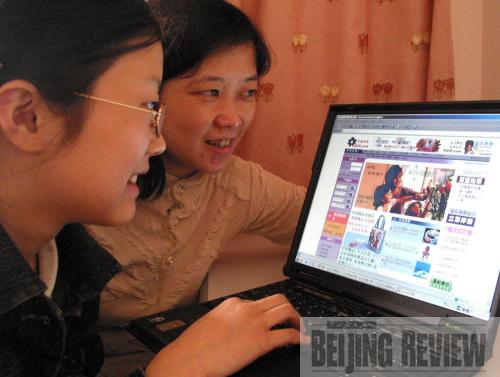|
 |
|
FAMILY SHOPPING TIME: A mother shops online with her daughter from their home in Shanghai. Online shoppers are increasing as the Internet makes shopping faster and more convenient |
Lin Yong, a 30-year-old information technology engineer in Beijing, noticed a new phenomenon in his company. "I found there is online shopping delivery coming into my office every day recently," he said.
"I'm myself one of the orderers," he added.
Lin's new discovery coincided with the latest survey on online shopping conducted and released by the Shanghai-based iResearch Consulting Group, an online customer behavior studies organization.
In 2008, China's registered online shoppers numbered 120 million, almost three times more than that of 2007. In the first half of 2009, China's top online shopping website, taobao.com, posted a registered usership of 145 million, an increase of 101 percent year on year. That is to say, almost half of China's 338 million netizens chose to make purchases online.
Better buy
As a former fishing enthusiast, Lin enjoyed buying fishing tackles but quickly found that Beijing was not a good city to buy fishing gear. Since most of the manufacturers are located in south China, prices in Beijing were much higher. Two years ago, however, he found cheaper products on taobao.com.
After that, he fell in love with online shopping. "I bought almost everything online, from socks to home appliances," Lin said.
"I don't like shopping in department stores, because they are too crowded and noisy. It is also getting more and more difficult to park there," he added.
For most online shoppers, lower prices seem to be the eternal lure. "Price is the most important factor for me in shopping online," said Fan Chenyue, a self-employed Web designer in Beijing.
Fan, a first-generation online shopper, began shopping as early as 2002 on 8848.com and joyo.com, China's earliest online shopping websites. Later, he conducted most of his shopping on taobao.com.
Recently, Fan calculated how much he had spent on online shopping. The total amounted to almost 100,000 yuan ($14,705.8).
As an automobile enthusiast, Fan is more than willing to buy and upgrade the various products for his car, such as a GPS navigator, car fridge and mobile generator.
"When I want to buy something, I would first go to the real shops to ask for prices and then go to taobao.com. My experience is that the price online is much lower than that in real shops," Fan said.
It is fair to say that online shopping has changed his lifestyle. In the past, the Web was a working tool for Fan. Now it has become a living necessity.
"I buy almost everything online. Now I only buy food in supermarkets," Fan said.
Kang Hui, mother of a 15-year-old girl in Wuhan, capital of Hubei Province, has gone so far as to buy food online.
Last year, a colleague gave her two bags of pecan nuts bought in Lin'an, a suburban town of Hangzhou, Zhejiang Province.
Her family all loved the pecan nuts, prompting her to buy more of the nuts online. "Although I can find pecan nuts in local department stores, I prefer to buy it from online shops which are Lin'an-based. I believe their products are fresher and cheaper," Kang said.
Five days after placing an order, she received her first online shopping food. She was very satisfied. Although some of her colleagues and friends warned her against buying groceries on the Internet, Kang continues her online food shopping spree.
"I try to find online shops with at least four diamonds (the credit rating of taobao sellers where more diamonds stand for a higher rating). I also read the feedback offered by other buyers," Kang said.
Kang is, however, concerned about where the sellers are located. "I buy jujube and dried apricot from a Xinjiang seller and preserved seafood from a Hainan seller, as the local foods are usually sold fresh and are much cheaper," said Kang.
For Lin, even diamonds and good feedback are not enough. "I'm concerned about whether these feedbacks were made recently. If they were made long, long ago, I will not choose to buy from them. Maybe the sellers used to be good, but now maybe they are not," Lin said.
Up until now, Lin's biggest online purchase was a digital camera worth more than 2,000 yuan ($294.1).
"The same as shopping in real stores, I prefer those acclaimed brands," said Lin.
Acclaimed brands offer nationwide quality assurance and provide buyers with a sense of confidence when making purchases. "No matter where I buy it, I can get customer service in Beijing," he added.
This year, Kang bought online food, a mosquito net, three shirts, two handbags and an electronic dictionary with a total cost of more than 1,000 yuan ($147). Fan bought a washing machine, a mobile generator and GPS navigator for a total of more than 10,000 yuan ($1,470.5).
According to taobao.com, the average spending by users between 16 and 24 years old is 1,000 yuan ($147). For those over 30 years old, the average spending is closer to 1,600 yuan ($235.3), and for those aged 50 and up, it is 2,000 yuan ($294.1).
| 